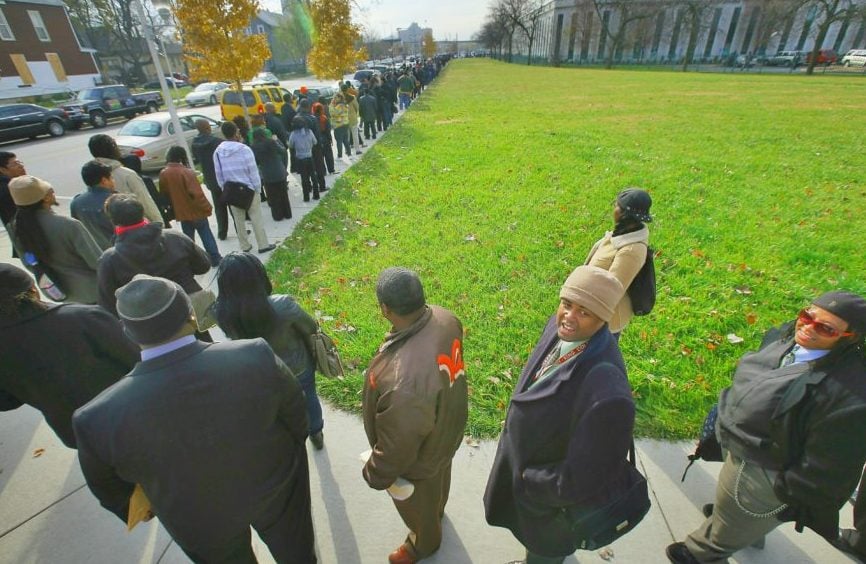If the economy is better, why are so many Black folks still unemployed?
President Trump says we're good, but our numbers tell a different story.
Rising wages, more jobs, and overall lower unemployment claims were all reported in the January 2018 jobs report. So, why are so many African Americans still unemployed. We investigate.

Looks like President Donald Trump needs to do a serious fact check…AGAIN.
After receiving word about rapper Jay-Z’s recent criticism of Trump’s reported references to Haiti and African nations as “shithole” countries on CNN’s “The Van Jones Show,” the President shot back on Twitter with a quip about the positive impact of his policies on the economy.
Somebody please inform Jay-Z that because of my policies, Black Unemployment has just been reported to be at the LOWEST RATE EVER RECORDED!
— Donald J. Trump (@realDonaldTrump) January 28, 2018
Then at last week’s State of the Union speech, Trump boasted how well Blacks seem to be doing under his presidency saying, “Something I’m very proud of—African American unemployment stands at the lowest rate ever recorded.”
Somebody (likely not Black) responded with zealous ovation from the audience as members of the Congressional Black Caucus sat perplexed on the chamber floor. Once again, Trump’s intel was wrong, or at the very least, extremely misleading.
According to the January 2018 jobs report from the U.S. Bureau of Labor Statistics, the Black unemployment rate is no longer at a record low, after jumping nearly a percentage point to 7.7 percent from 6.8 percent in December 2017.
Keep in mind that the national unemployment rate has held steady around 4.1%.
“The sample size for African Americans’ [unemployment rate] is relatively small, so sharp fluctuations are not unexpected,” explains Julianne Malveaux, Ph.D., a Washington, D.C.-based economist and President Emerita of Bennett College.
While we’ll know better in February whether the rate jump was a fluke or cause for alarm, Malveaux says, the President’s response was interesting to say the least.
READ MORE: BLACK UNEMPLOYMENT RATE IS LOWEST EVER
“The President talked about how his policies pushed the unemployment rate down. Are those the same policies that caused the stock market to lose 2 percent of its value last Friday?” she asks.
The stock market takes a dive
Since then, the stock market hit an all-time low on Monday when the Dow dipped to a record 1,175 points indicating the index’s worst day since August 2011.
While investors are freaking out, Black people remain out of work. Black unemployment is typically twice that of white unemployment rates, and contrary to what Trump has insinuated, that has not changed, says Malveaux.
The reasons are plentiful. First, some have literally stopped looking for work because they think they can’t find it, while others can’t afford the costs associated with seeking new employment, and lastly, discrimination, of course, still exists.
When low is really high
Even still, Malveaux says African Americans are in a similar position as we were under former President Barack Obama.
“Indeed, the decline in unemployment rates, overall, and among African Americans, began under President Obama,” she says. “Neither President Obama nor President Trump specifically targeted programs to bring down Black unemployment. Yet, as the economy expanded and as the Federal Reserve kept interest rates low, all unemployment rates dropped.”
READ MORE: RACIAL UNEMPLOYMENT GAP PERSISTS
The good news is wages increased by about 2 percent in 2017, and those African Americans who are working experienced that growth along with other workers. In addition, minimum wage increased in several states and there were 200,000 jobs created last month. All that to say, we are making more money and there are more jobs to be had.
As for Trump, his rhetoric attempts to normalize economic inequality. Otherwise, says Malveaux, he would not have touted a “low” Black unemployment rate.
“While it is clear that a one-month jump in the Black unemployment rate is not alarming, it is also clear that an intellectually dishonest President who touts the progress of a 6.8 percent “low” Black unemployment rate must now also explain why this rate has gone up,” she says.
The only way to close the unemployment gap between whites and Blacks is systemic. “We need to focus specifically on structural differences, educational differences, and the persistence of discrimination in the labor market,” explains Malveaux.
Otherwise, the improvements will never be enough.
Tanisha A. Sykes is an award-winning money, careers, and small business writer in New York City.
